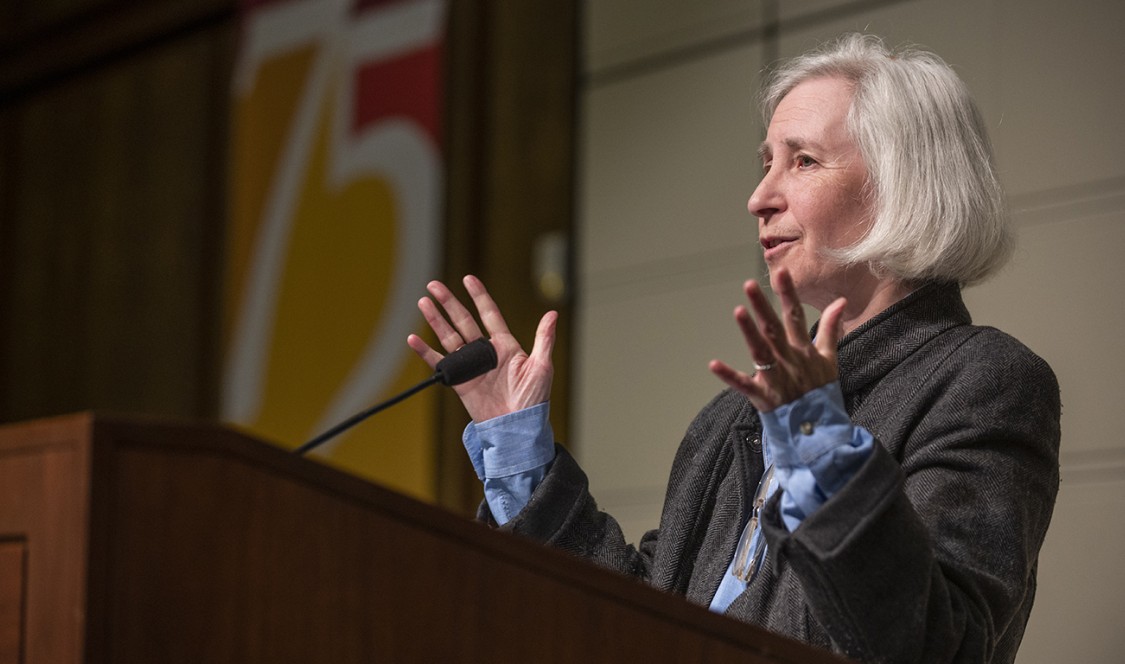Why are juvenile offenders in the U.S. criminal justice system treated more harshly than child-soldiers under international law?
Legal thinker Martha Minow posed that and other questions at the Marian Miner Cook Athenaeum on Oct. 28. The former Harvard Law School dean and current 300th Anniversary University Professor was the fourth in a lineup of intellectual luminaries to appear as part of the Ath’s 75th Anniversary Distinguished Speaker Series, which earlier this semester welcomed Atul Gawande, Anna Deavere Smith, and Steven Pinker.

Earlier in the day, Minow visited CMC classes, led a seminar, and met with a small group of students at the Henry Salvatori Center for the Study of Individual Freedom in the Modern World.
Minow’s talk, “When Should Law Forgive?” stitched together topics such as child-soldiers, U.S. bankruptcy law and South Africa’s Truth and Reconciliation Commission. A legal scholar noted for her boundary-blurring insights, Minow put the spotlight on “positive criminology” and experiments in restorative justice.
She began by contemplating our politically polarized moment: “I have spent my entire career working on social division and disadvantage,” she said, “and I have never been more worried than I am right now.” The way forward, she argued, lies is cultivating “a generosity of spirt.”
Quoting South African leader Nelson Mandela, Minow observed: “Resentment is like drinking a poison and then hoping it will kill your enemies.”
The antidote to this poison: forgiveness.
But what is forgiveness? And who has power to grant it?
“Forgiveness is a superpower that we all have,” she said. “It’s a non-depleting resource. It offers physical, psychological and practical relief for both wrongdoers and for victims of wrongdoing.”
It has its limits, she admitted. “Mass murder, rape, abduction of children, genocide—some acts simply go too far,” she said. “And forgiveness has to be chosen. Pressure on a victim to forgive looks like a new kind of victimization.”
Yet in the case of child-soldiers, Minow spotlighted how international human rights law focuses on prosecuting those adults who draw children into armed conflict. It does not seek to punish the child-soldiers themselves, even when they have committed heinous war crimes. Instead, most child-soldiers are offered counseling, education, and job opportunities.
“Contrast that with the United States’ treatment of juvenile offenders. We are punitive. We severely punish minors, often sending them to adult courts and prisons,” Minow said. “But what if young people caught in criminal activity or violence could have chances to accept accountability, gain opportunities to rebuild their lives and their communities?”
Minow offered an intriguing glimpse of forgiveness seen through the lens of bankruptcy law and debt pardoning. Literally written into the U.S. Constitution, the ability to offer debtors, both private and corporate, a “fresh start has made the United States the envy of the world when it comes to innovation.”
“I wonder why we don’t have that in criminal law,” she mused. “I think we could learn a lot by this kind of comparison.”

